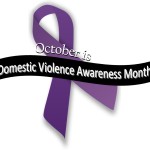Domestic Violence: How to get out of an Abusive Relationship

I recently read a powerful article/blog by Justin Peters on www.slate.com. In it, he explains how the government shut down is very bad for Domestic Violence Victims. He goes on to state that most DV help centers around the country rely on funding dispersed through the Office on Violence Against Women www.ovw.usdoj.gov. Because of this, many programs that do not have the option to draw from other funding resources will be forced to reduce staff or shut down their centers all together. This will leave many Domestic Violence victims and their children with no where to go for help. It is now more important than ever to take the time to educate yourself on what Domestic Violence is and what behaviors the abusers take to victimize their victims. To gain more understanding, here are some tips and explanations to help you identify if you are possibly in a dangerous and destructive relationship
R-e-s-p-e-c-t, find out what it means to me:
Understanding why and how to gain the strength to get out of an abusive relationship
If you or someone you know is in an abusive relationship, you need to get the heck out. Life is too short to live with someone who treats you badly. It might seem too scary and overwhelming to contemplate leaving, but for the safety of yourself and your children, you need to do it. You might be asking yourself, “Why does he treat me like this? I know deep down inside he loves me.” So, to understand why men batter women, I conferred with the National Coalition Against Domestic Violence (NCADV.org ) and came up with these tips…
Why O Why?
According to the NCADV, there are many speculations on why men batter their mates. They include: Family dysfunction, inadequate communication skills, provocation by women, stress, chemical dependency, lack of spirituality and economic hardship. These might be reasons why men batter women, but they are not the root cause. Removing these factors does not end the violence. The batterer begins and continues the behavior because he believes that violence is an effective method for gaining and keeping control over another person. Plus, he usually does not suffer any adverse consequences as a result of his behavior. Historically, domestic violence has never really been treated as a “real” crime. The evidence that supports this is the lack of incarceration and financial penalties for men guilty of abusing their partners. Also, the batterers rarely are ostracized in their communities, even if it is known that they beat their partners. Therefore, people of this nature have no guilt or sense of wrong doing.
If the Shoe Fits
Batterers come from all different backgrounds and different personality profiles. But there are general characteristics that fit the profile of a batterer.
Oink, Oink—Batterers are basically male chauvinist pigs who do not see woman as people, but as property or sexual objects. They do not respect woman as a group.
Mr. Insecurity—Low self esteem, a sense of powerlessness and ineffectiveness in the world are their inner secrets. They may appear to be successful, but inside they feel extremely inadequate.
It’s All Your Fault—Batterers blame other people for their problems or behavior. Stress, something their partner did, alcohol or other factors become the batterer’s excuse for his violent reactions.
Eddie Haskell (fromLeave it to Beaver)—The batterer often is seen as charming and sweet by the neighborhood, but behind closed doors, it’s another story. He can be calm and loving to his partner one time and extremely volatile the next.
You Belong to Me—Character traits of potential batterers include extreme jealousy, possessiveness and a bad temper. If a guy is unpredictable and/or verbally abusive, find another date.
Domestic Violence happens in rich neighborhoods and poor neighborhoods. Batterers are of all skin colors and nationalities. Their behavior, characteristics and personality profiles set them apart from other men.
Why Stay?
Why do women stay in abusive relationships? To many people, the thought of staying in a violent, demeaning situation is incomprehensible. It is difficult to understand what would prevent a victim from leaving. But for millions of women, the reasons are very clear:
He’s got her by the purse strings—If a woman has at least one child and is not employed outside the home, all of the cash, property and other assets are likely to be controlled by the spouse or partner. This makes it very difficult for a woman to move out and support herself and the child financially. For some women, it would mean a substantial drop in the standard of living for her and her child, and the guilt associated with that also prevents her from leaving.
Together forever—Many clergy and secular counselors are often trained to encourage couples to stay together and “save the marriage”, no matter what, rather than acknowledging the root of the problem and assisting to stop the violence. Many victims also feel that divorce is not a viable solution. For the sake of their children, some abused mothers feel that a violent father is better than no father at all.
Nowhere to run to, baby; nowhere to hide—Even a restraining order does little to protect the victim if the abuser chooses to return and repeat the assault. There has been an increased public awareness of domestic violence and a number of shelters have been opened to help keep some of these women safe. Unfortunately, there still are not enough shelters to support the needs of all victims of domestic abuse.
Failure is not an option—Many women are conditioned to believe that they are solely responsible for making their marriage work. If the marriage ends, they are failures. A lot of women are taught that their identity and self-worth are based on getting and keeping a man (no matter how badly he treats her).
All by myself—Some abused women become isolated from friends and family, either by the jealous, possessive partner or because they are trying to hide the signs of abuse from the outside world. In either case, these women feel isolated and believe they have no one to help them and nowhere to turn.
I’m Dreamin’—The abuser rarely beats the woman all the time. During those non-violent times, he may fulfill the woman’s dream of romantic love. She believes that he’s basically a good man with a bad temper. This reinforces her reason to stay. She also may rationalize that her abuser is basically good. When bad things happen, he just needs to let off a little steam.
Regardless of the reason, many woman stay in these violent, dangerous relationships and need to get out. With education and strong support, more and more women are finding the strength to do so. If you are one of those women, there are many places that you can go for more information, even though some of these programs are in jeopardy with the Government shut down, the larger groups like NCADV may be able to give you more information. If you are in life threatening/emergency situation, ALWAYS call 911 immediately or get to your local police for help.
NATIONAL DOMESTIC VIOLENCE HOTLINE: 1-800-799-7233 (SAFE)

